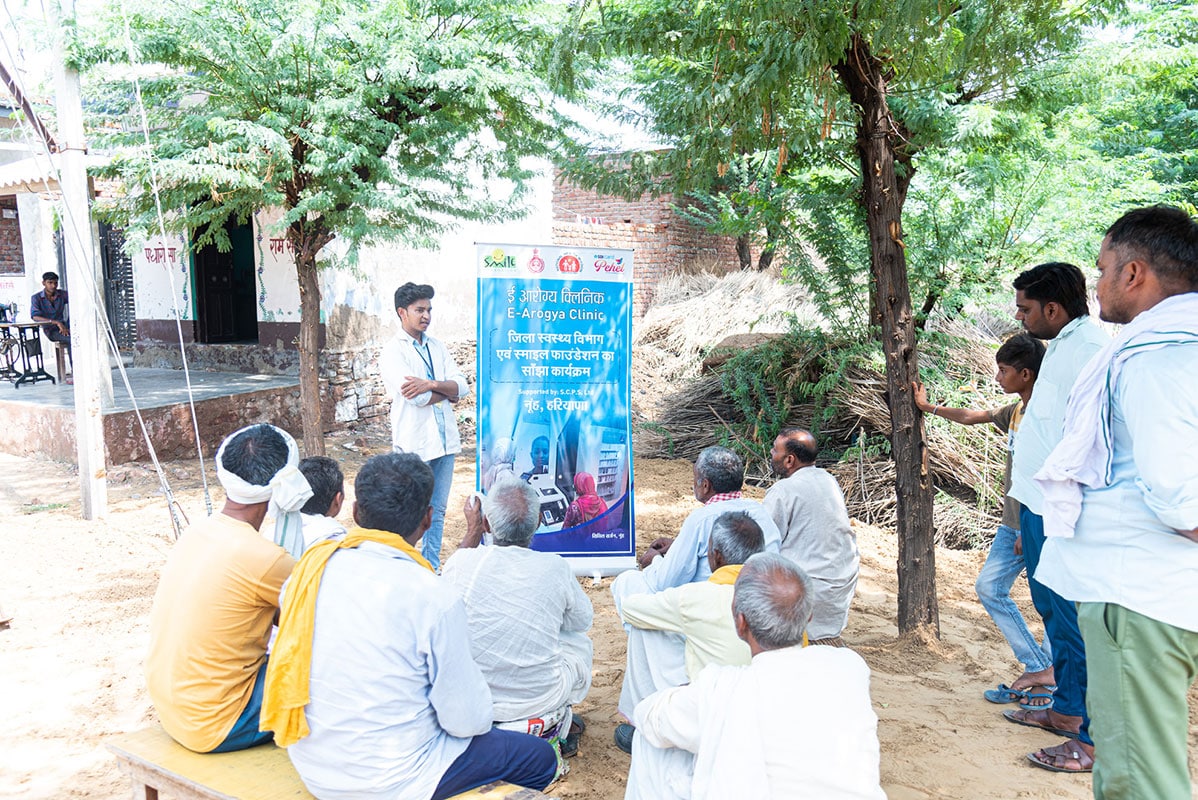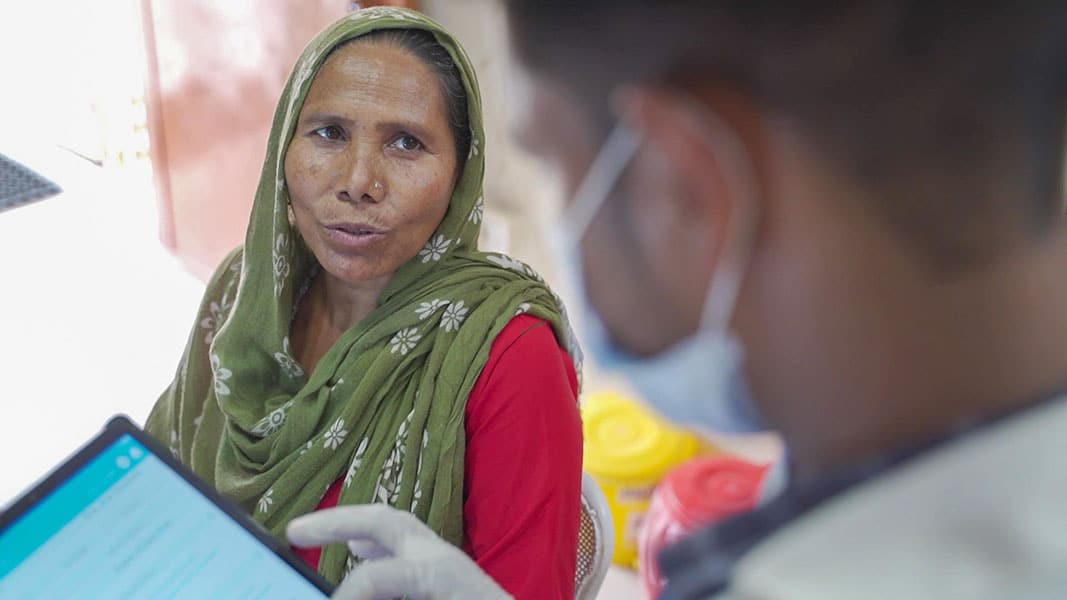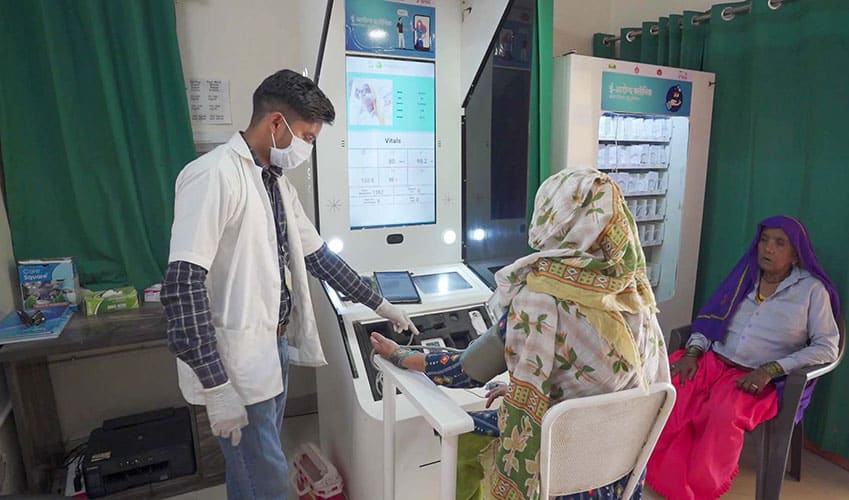July 2023

Noora Khan, an elderly gentleman lives with his wife in one of the villages of Mewat, Haryana. One night, he had a strong bout of cold and experienced acute pain in his chest. With his sons refusing to support him in any way, he turned to the local doctor of his village. Unfortunately, the doctor, though well-intentioned, was unable to relieve Mr. Khan of his recurring pain.
Seeing his plight, the doctor advised him to get himself treated at a hospital in the city and prescribed him some medicines, most of which he could not afford. With his health deteriorating rapidly, his wife had no option but to sell off all her jewelry. The money from the jewelry sold covered the cost of just one medical consultation.
Left with barely any funds, Mr. Khan reached out to Smile Foundation’s Health and Wellness Centre and availed of Telemedicine healthcare services which helped his health to recover. He also took his wife to the telemedicine centre to get her eyes treated. They are both well now.
Telemedicine in India
India is witnessing technological innovation which is solving societal problems with speed across various sectors. One such example lies in the healthcare space, where technology is helping drive access and is improving the quality of services rendered. The pandemic has shown that having a strong digital layer is a prerequisite for providing access to quality healthcare across the country. The only way to make healthcare delivery successful is to combine technology with the skill available on the ground.
India is the most populous nation in the world, with 64.61% of its citizens residing in rural areas. However, a paucity of doctors in rural India has led to a challenge in meeting the healthcare needs of those residing in rural India. Telemedicine can play a pivotal role in meeting this challenge by ensuring that every citizen of India, regardless of their location has access to proper healthcare services. Through virtual consultations with doctors, rural and underserved communities across the nation are granted access to basic healthcare services and medication.
The term Telemedicine refers to the practice of delivering healthcare services to remote areas by healthcare professionals through the help of communication technologies to ensure the well-being of individuals and communities.

Benefits of Telemedicine
Telemedicine helps to bridge the gap between geographical boundaries and provides an opportunity for people residing in remote areas of the country to connect with doctors and receive timely consultation, and medication, in addition to medical services. Telemedicine curtails travel expenses, and saves precious time and in the event of an illness, patients are duly taken care of and administered proper medication by doctors. Telemedicine also allows both patients and caregivers to avoid high-risk environments.
Smile Foundation’s Telemedicine Programme

To ensure that the underserved communities residing in remote rural areas of the country have access to proper healthcare, Smile Foundation has supplemented its flagship mobile healthcare programme Smile on Wheels with Telemedicine projects.
One of these projects is being implemented with support from Pehel, the CSR initiative of SBI Card & Payment Services Limited, in association with the Government of Haryana. The project entails the establishment of 10 E–Arogya Clinics comprising telemedicine kiosks with Medicine Vending Machines in the aspirational district of Nuh in Haryana, and aims to provide healthcare services to over 10,000 underserved people.
At these telemedicine clinics, people from rural areas are able to access quality healthcare services including diagnostic consultations, free video teleconsultation, maternal and child care, free medication and point of care tests. The project works closely with frontline health workers, liaising with local health administration, and also building capacities of ASHA and ANM workers. The telemedicine clinics are operated by trained nurses, who assist patients with real-time remote consultation with qualified doctors over an audio-visual interface.
Telemedicine Technology Powered by AI

Advancements in the field of telemedicine technology has led to the integration of Artificial Intelligence (AI) which has resulted in greater efficiency in caregivers, in addition to empowering them to monitor a patient’s health remotely. Smile Foundation also employs error prevention strategies through the use of software named E-Doctor, which has an inbuilt Clinical Decision Support System (CDSS) for reducing human error in healthcare.
In addition, the adoption of software powered by AI has led to better treatment of diseases, apart from helping in diagnosis, intelligent queue management, triaging, and real-time monitoring of doctor consultations. CDSS further ensures that each consultation follows the guidelines and recommendations for clinical practice or public health policy of the World Health Organization
(WHO), in addition to following their guidelines for reproductive, maternal, and child health.
Remote Patient Monitoring on Clinical Outcomes
The health of every patient visiting Smile Foundation’s Telemedicine Clinics is tracked and monitored with the help of wearable biosensors for remote patient monitoring of clinical outcomes, and post-visit counseling. Our Telemedicine Clinics further partner with local pharmacies to provide medicines free of cost or at a pre-approved rate to patients, based on a prescription.



